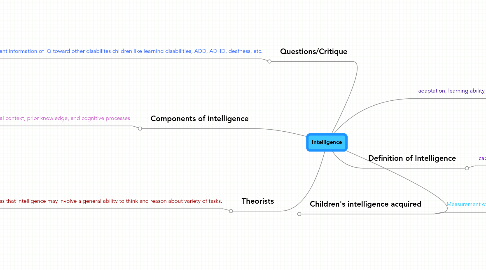
1. Components of intelligence
1.1. Environmental context, prior knowledge, and cognitive processes
1.1.1. environmental context focuses on three skills as problem-solving ability as identify the problem, verbal ability to speak and write clearly and social comptence as ability to relate other human beings, needs, wishes and provide leaderships
2. Children's intelligence acquired
2.1. Measurement of intelligence tests
2.1.1. distributed intelligence: thinking facilitated by physical objects and technology, social support and concepts and symbols
2.1.1.1. intelligence tests: general measures of current cognitive functioning used to predict academic achievement
2.1.1.1.1. Standford-Binet Intelligence Scale, Wechsler Scales and Kaufman Assessment Battery for Children
3. Theorists
3.1. Spearman's concept of g as reflecting the ideas that intelligence may involve a general ability to think and reason about variety of tasks.
3.1.1. Cattrell's fluid and crystallized intelligences: fluid intelligence is an ability to acquire knowledge quickly and adapt to a new situation and crystallized intelligence is a knowledge and skills accumulated from prior experience and schooling
3.1.1.1. Gardner's multiple intelligences: linguistic, logical-mathematical, spatial, musical, bodily-kinesthetic, interpersonal, intrapersonal, and naturalist
4. Questions/Critique
4.1. Insufficient information of IQ toward other disabilites children like learning disabilities, ADD, ADHD, deafness, etc.
4.1.1. Provide a lot of examples toward Gardner's multiple intelligence to understand better concepts
4.1.1.1. Provide a lot of information toward the study of twin and adoption studies to compare from one to another
4.1.1.1.1. Interesting category of memory like symbolic, spatial, object, cube design, analogic reasoning, and mazes to define each
